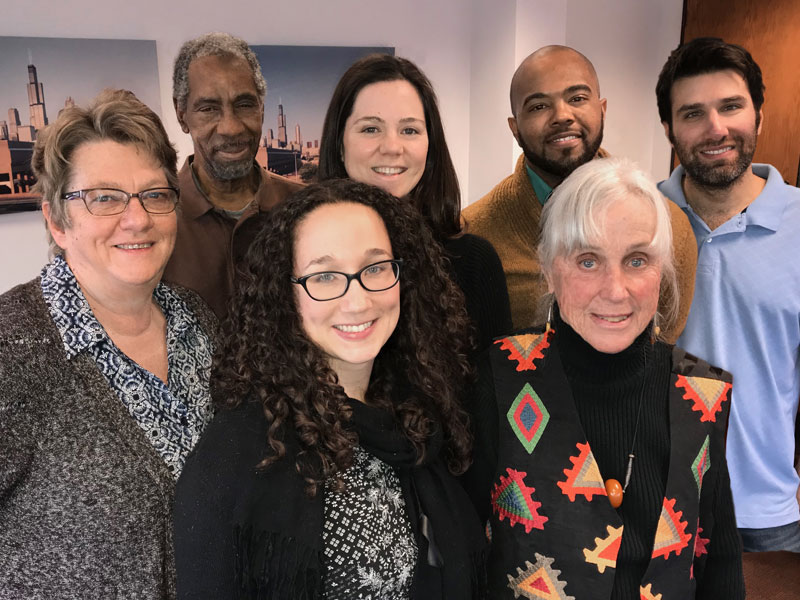The College’s Macro-Focused MSW Specialization: Organization and Community Practice

Chicago is one of the most segregated cities in the United States. With the structural inequities that arise from such intense segregation, Chicago communities sometimes struggle to marshal the strengths and resources that they possess and that would lift them out of poverty and marginalization. However, organizations and residents in many Chicago neighborhoods are coming together to create positive change for their families and their communities.
This is the context for the college’s new specialization in macro social work, Organization and Community Practice (OCP), which will train social workers to join with communities in developing community-based and participatory responses to systemic inequities and injustices.
A Community Health and Human Rights Framework
Jane Addams would not have known the term “macro social work,” but she was most definitely a macro practitioner. She understood that environment and the social determinants of health underpin the well-being of both individuals and entire communities.
The OCP curriculum is conceptually grounded in a framework of social determinants of health and human rights, asserting that basic human needs – clean air, clean water, healthy food, adequate and safe housing, reliable transportation, a living wage and quality education – are essential conditions for a healthy life, and therefore a fundamental right to which all are entitled.
OCP will shift the narrative away from being needs-based, as with typical social services, or philanthropy-based. Students will learn to address the structural and systemic conditions that limit health and quality of life in marginalized communities. Through interventions at the community level, they will learn to build knowledge from within the community, and use that knowledge to foster community development, shape public awareness of the issues and the solutions, and shape public policy.
A Skills-Based Approach to Leadership
One of the goals of OCP is to produce leadership for advancing social justice as community partners. Instead of being population-focused or problem-focused, OCP will take a skills-based approach to prepare students for management roles or for launching a grassroots organization.

OCP faculty members (L-R), top row: Clinical Asst. Prof. Edward Potts, Asst. Prof. Sarah Reed, Asst. Prof. Branden McLeod and Asst. Prof. Aaron Gottlieb. Lower row: Prof. Alice Butterfield, Asst. Prof. Karen D’Angelo, and Director of Field Division Barbara Coats.
For example, students will learn to maintain an organization’s services by increasing its financial base. They will examine the current context of foundations and public funding. They will learn how to identify sources of funding and to write grant proposals. And they will develop a response to an RFP for funding.
Students will have the opportunity to learn about human resources development, maintaining diversity and doing organizational assessments. Or they may learn about social entrepreneurship as an alternative model for accomplishing social change.
The OCP curriculum will also cover the use of technology for social change. Examples include the use of GIS mapping to show the distribution of community resources, using social media for organizing and advocacy, or using other digital tools for data collection or storytelling.
The practical skills acquired in OCP will be transferable across a number of different roles, in a number of different settings. Students will be prepared to pursue careers in non-profit organizations, human services, government, or even in the for-profit sector in positions such as community liaison or corporate responsibility.
Policy Reform as Social Advocacy
Macro practitioners understand how public policy can impact vulnerable populations, positively or negatively. OCP will prepare students for community-based policy practice to protect human rights and reduce health inequities. They will learn to work with communities and organizations to identify problems and develop a responsive strategy for shaping public policy at the local, state or federal level.
For example, students will set up a task force to identify key social issues in Chicago communities, such as poverty and the lack of financial institutions, food deserts, or the impact of criminal justice reform on families. They will then form smaller groups that focus on each issue. They will reach out to community organizations, analyze policies, and summarize findings into a policy brief. The students will develop talking points to be used in contacting the media or talking to legislators. They will also write op-ed pieces and will be encouraged to submit those for publication through news outlets.
Certification in Human Services Management
Students graduating from the OCP specialization will be prepared to obtain Human Services Management certification from the Network for Social Work Management. The certification confirms competencies in executive leadership, strategic management, resource management and community collaboration.
In establishing the OCP curriculum, faculty have paid special attention to ensuring that students will be fully prepared for the certification exam, and certification will help graduates demonstrate their competencies to prospective employers.
Macro-Focused Field Placements
The college maintains relationships with more than 300 organizations in communities throughout the Chicago metropolitan area, all working with vulnerable populations. Similar to other MSW specializations, OCP will offer field placements (internships) in community organizations where students can gain real-world experience in community-based macro practice.
OCP students will work directly with community leaders, residents, organizational administrators and direct service workers, and in the process be exposed to multiple levels of policy debate. They will utilize qualitative and quantitative analysis and participate in the implementation of studies to identify key factors leading to the development of innovative social policies. Working with their community partners, they will advocate for social policies that advance human rights and social, racial and economic justice.